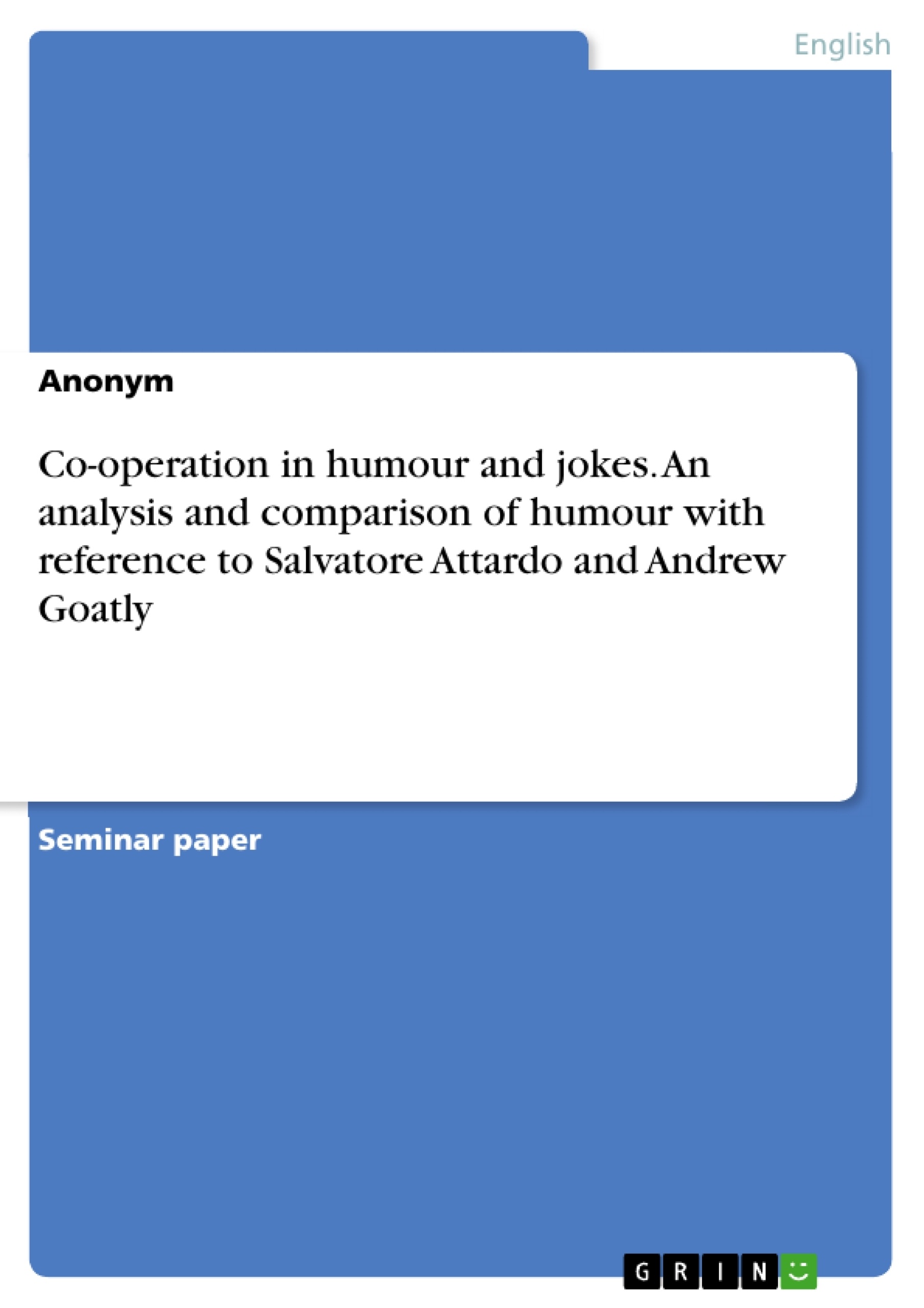This term paper will deal with the violation of maxims in the section of humour, mainly analysing the article “Violation of conversational maxims and cooperation: The case of jokes” by Salvatore Attardo (1993) and Andrew Goatly's (2012) chapter ”Pragmatics: co-operation and politeness” in “Meaning and Humor”.
Before analysing the article “Violation of conversational maxims and cooperation: The case of jokes” by Salvatore Attardo and Andrew Goatly's “Meaning and Humor”, we have to focus on Paul Grice's cooperative principle (CP). Grice presented the CP in 1967 and his idea was that hearer (H) and speaker (S) have to speak cooperatively and accept each other to be able to understand each other. It describes how functional communication is achieved in a conversation. In Grice's opinion, society can only function communication if it is oriented towards co-operation. He suggests that there is a way of speaking which we all accept as a kind of standard behaviour and that conversation and social interaction “is guided by the co-operative principle (CP)” (Goatly 2012, 225), which states “Make your contribution such as it is required, at the stage at which it occurs, by the accepted purpose or direction of the talk exchange in which you are engaged.” (Grice 1975, 41-58).
Inhaltsverzeichnis (Table of Contents)
- Introduction
- Paul Grice's cooperative principle
- The Maxim of Quantity
- The Maxim of Quality
- The Maxim of Relation
- The Maxim of Manner
- Salvatore Attardo's “Violation of conversational maxims and cooperation: The case of jokes”
- Violation of the four maxims
- The paradox
- Goatly's “Pragmatics: co-operation and politeness”
- Violation of a maxim
- Flouting of a maxim
- Flouting Quality
- Flouting Relation
- Flouting Manner
- Goatly on CP and PP
- Conclusion
Zielsetzung und Themenschwerpunkte (Objectives and Key Themes)
This term paper aims to analyze the violation of maxims in the context of humor, primarily focusing on Salvatore Attardo's (1993) article "Violation of conversational maxims and cooperation: The case of jokes" and Andrew Goatly's (2012) chapter "Pragmatics: co-operation and politeness" in "Meaning and Humor".
- The role of the cooperative principle (CP) in understanding communication and its violation in humor.
- The different types of maxims and their violation in jokes and humorous situations.
- The interplay of cooperation and politeness in the context of humor and how they contribute to the creation of humor.
- The theoretical frameworks of Attardo and Goatly in analyzing the relationship between maxims, cooperation, and humor.
- The paradox of how violating maxims can contribute to successful communication and understanding in humor.
Zusammenfassung der Kapitel (Chapter Summaries)
The introduction sets the stage for the term paper by illustrating the concept of violating maxims through a personal anecdote. It then introduces the main focus of the paper: the violation of maxims in humor, specifically analyzing the works of Attardo and Goatly.
Chapter 4 delves into Paul Grice's cooperative principle (CP) and its role in communication. The CP is presented as a guiding principle for effective and cooperative communication, and it outlines four maxims: Quantity, Quality, Relation, and Manner. The paper explains how these maxims are crucial for understanding each other in a conversation.
Schlüsselwörter (Keywords)
This term paper focuses on the following keywords and concepts: cooperative principle, conversational maxims, violation of maxims, humor, jokes, pragmatics, co-operation, politeness, Attardo, Goatly.
Frequently Asked Questions
What is Paul Grice's Cooperative Principle (CP)?
The CP is a fundamental concept in pragmatics stating that participants in a conversation should make their contribution as required by the accepted purpose of the talk exchange. It is guided by four maxims: Quantity, Quality, Relation, and Manner.
How do jokes relate to conversational maxims?
Humor often arises from the intentional violation or flouting of conversational maxims. For example, a joke might provide too little information (violating Quantity) or be intentionally ambiguous (violating Manner) to create a comedic effect.
What are the four maxims mentioned by Grice?
The four maxims are: Quantity (be as informative as required), Quality (be truthful), Relation (be relevant), and Manner (be clear and avoid ambiguity).
What is the difference between "violating" and "flouting" a maxim?
Violating a maxim is often done quietly (e.g., lying), while flouting involves blatantly failing to observe a maxim to prompt the hearer to look for an additional, implied meaning (implicature).
What are the key theories of Salvatore Attardo regarding humor?
Attardo focuses on how the violation of conversational maxims is a defining characteristic of jokes. He explores the paradox of how non-cooperative behavior in a linguistic sense can lead to successful communication of humor.
How does Andrew Goatly connect cooperation and politeness?
Goatly examines the interplay between the Cooperative Principle (CP) and the Politeness Principle (PP), showing how social norms of politeness can also influence how maxims are handled in humorous interactions.
- Citation du texte
- Anonym (Auteur), 2016, Co-operation in humour and jokes. An analysis and comparison of humour with reference to Salvatore Attardo and Andrew Goatly, Munich, GRIN Verlag, https://www.grin.com/document/334661



